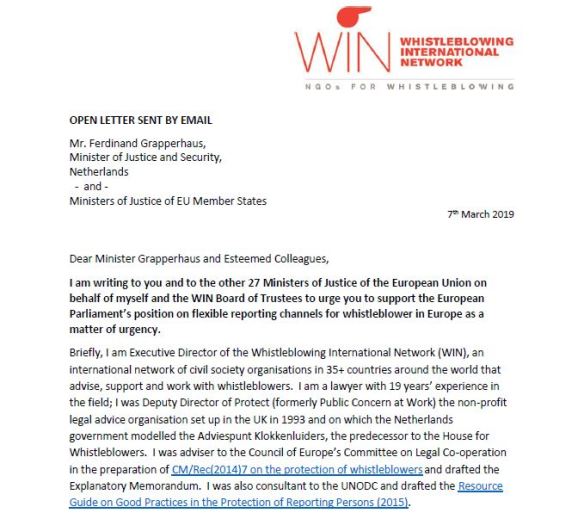WORLD WHISTLEBLOWING CALENDAR
Spotlight on whistleblowing
26th March 2019
1pm – 5pm
Royal Society of Medicine
1 Wimpole Street
London
This event will bring together policy-makers, researchers, clinicians and other healthcare professionals to understand the climate for whistleblowers within the NHS.
The event will:
- Analyse the progress made since the Francis report to change the culture within the NHS
- Evaluate the lessons learnt from the inquiry into hyponatraemia-related deaths
- Understand the impact of dysfunctional teams on patient safety
- Explore whistleblower and patient perspectives
Key speakers include Caroline Dinenage – Minister of State for Care, Department of Health and Social Care; Professor Mike Bewick – Deputy Medical Director, NHS England and Dame Clare Marx – Chair, General Medical Council.
Click here for more information and tickets.
Whistleblowing: Technology, Procedures and Experiences
1st April 2019
10:00am – 5:30pm
UPV – School of Computer Science Engineering ETSINF
Building 1H
Valencia
The Universitat Politécnica de València will bring together whistleblowing organizations from America, Africa, Asia and Europe to share technological, media and tactical experiences of the protection of whistleblowing. Participating organisations and activists will reflect on different ways to promote reporting in a safe manner, as well as the protection of those who risk doing so today.
Sharing experiences, failures, successes and learning to teach those working in the field of whistleblower protection (and all involved in causes of social change, transparency and fight against corruption and other crimes) what factors should be taken into account when promoting initiatives of this kind.
Panels will include – Technological tools: Towards anonymous and secure complaints; Building a culture of denunciation (featuring Anna Myers, WIN Executive Director and Annegret Falter from Whistleblower-Netzwerk, a co-founder of WIN) and a session on the experience in the Valencian community.
Click here for more information and to register.
Transparency International Australia national conference 2019 – Tackling Corruption Together: Rebuilding Trust in Australian Business and Regulators
4th April 2019
ZINC Federation Square
Melbourne
In the wake of the Banking Royal Commission and evidence that Australia has become a key destination to launder money through the property market and other channels, itis clear that action is needed to strengthen transparency, integrity and accountability.
TI Australia’s national conference will set the stage for public officials and business leaders to learn from each other, demonstrate good practice and champion a path towards better governance and responsible business conduct.
The conference program will include a session on the role of whistleblowers in prevention corruption and bribery, exploring the most effective ways to protect and support whistleblowers.
The conference will be preceded by the National Integrity Forum, where participants from across Australia’s public integrity bodies, civil society, business and the media will debate current options for strengthening Australia’s national integrity system.
For more information, including details of how to register, please visit the conference website.
The Perugia Principles: new guidelines for journalists working with whistleblowers
4th April 2019
6pm – 7pm
Sala Brugnoli, Palazzo Cesaroni
Perugia
The global industry launch of The Perugia Principles will take place at the International Journalism Festival 2019. The Perugia Principles are a new set of guidelines for journalists working with whistleblowers in the digital context published in English, Spanish, Greek, German and Russian.
These guidelines were developed collaboratively with an international panel of investigative journalists and academics with the final 12 principles developed in consultation with Blueprint for Free Speech, the Reuters Institute for the Study of Journalism (RISJ) at the University of Oxford, the International Center for Journalists (ICFJ), the World Editors Forum within The World Association of Newspaper and News Publishers (WAN-IFRA) and The Signals Network.
This panel will bring together lead authors of the Perugia Principles, Julie Posetti and Suelette Dreyfus, with internationally acclaimed investigative reporters Julia Angwin, Frederik Obermaier and Gerard Ryle to debate the Principles and their value to contemporary journalism.
More information on this session can be found here.
IF YOU HAVE DETAILS OF AN EVENT RELATING TO WHISTLEBLOWING LAW AND/OR PRACTICE THAT YOU WOULD LIKE POSTED HERE, PLEASE EMAIL:
info@whistleblowing
network.org


 The agreement was announced by Virginie Rozière at a European Parliament Press Conference this morning.
The agreement was announced by Virginie Rozière at a European Parliament Press Conference this morning.
